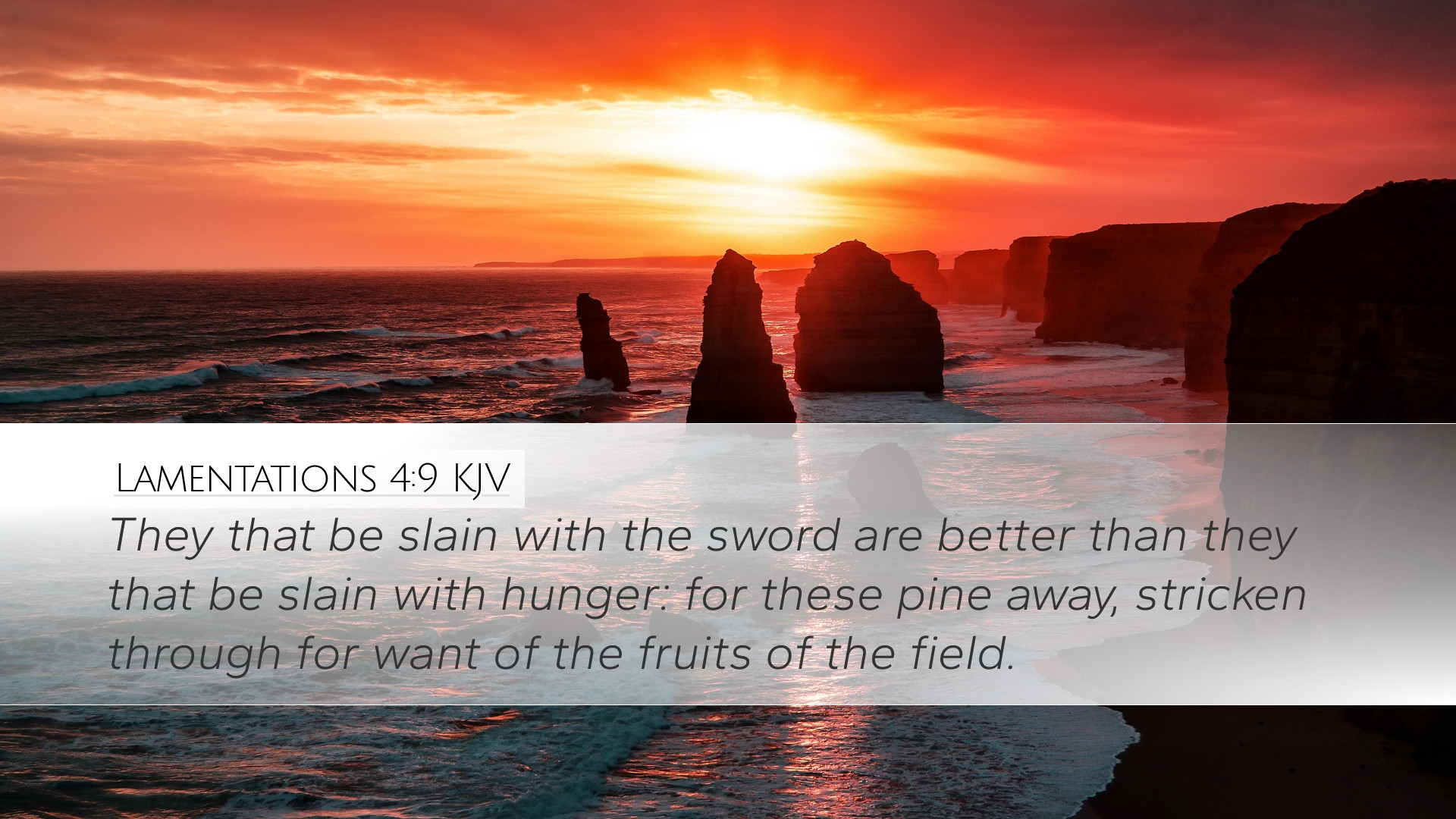Lamentations 4:9 Commentary
Bible Verse: "They that be slain with the sword are better than they that be slain with hunger: for these pine away, stricken through for want of the fruits of the field."
This verse in Lamentations expresses a profound lamentation over the dire circumstances faced by the people of Jerusalem during the siege. It juxtaposes two forms of death: that caused by the sword versus a slow demise through starvation. The poignant grief of the poet highlights the desperation and suffering of those experiencing the consequences of sin and divine judgment.
Contextual Overview
The Book of Lamentations is attributed to the prophet Jeremiah and provides an emotional account of the destruction of Jerusalem. It is a poetic reflection on the fall of the city and the resulting anguish of its inhabitants. This chapter, in particular, delves into the extreme distress experienced during the Babylonian siege, emphasizing the severe loss of life and the desperate plight of the survivors.
The Deaths Compared: Sword vs. Hunger
The verse presents a stark comparison between two tragic fates:
-
Death by the Sword:
This method of death is sudden and often seen as more merciful. Those who die by the sword face a quicker end and are not subjected to the prolonged suffering associated with starvation.
-
Death by Hunger:
In contrast, death by starvation is depicted as a torturous process. As the body slowly deteriorates, the victims experience agony, despair, and a profound sense of hopelessness. It serves as a stark metaphor for the spiritual and physical decline of a people under divine judgment.
Theological Implications
The juxtaposition of these two fates raises critical theological questions about suffering, justice, and the nature of God's judgment. The lament emphasizes that while death by the sword might seem a more brutal end, the suffering caused by spiritual famine is far worse. This reflects the biblical principle that spiritual life is foundational to human existence, and when men are deprived of this sustenance, the consequences are dire.
Insights from Public Domain Commentaries
Matthew Henry's Commentary
Matthew Henry emphasizes the notion that the state of the soul during times of distress is paramount. He notes that the anguish of starvation extends beyond the body; it carries profound spiritual implications. He suggests that those who die by the sword may indeed find peace more readily than those who languish in hunger, for the latter’s suffering is prolonged, and often accompanied by despair over lost hope and relationship with God.
Albert Barnes' Commentary
Albert Barnes points out the gruesome reality facing those in siege. He further explains that the comparison underlines the severity of Jerusalem's plight. While quicker death might be mourned, the spiritual and physical agony faced by the starved reflects the nation's abandonment by God. This commentary underscores the lesson that spiritual sustenance is essential, and when this is absent, the suffering is as intense as physical deprivation.
Adam Clarke's Commentary
Adam Clarke provides a historical perspective, noting the sociocultural context of the time. He elaborates on how people regarded death in battle as honorable, while death by starvation was seen as disgraceful. Clarke highlights that though the loss of life from starvation may appear to be a more despicable outcome, it underscores the dire consequences of turning away from God. He implies that spiritual starvation leads to the most profound existential crisis, as it signifies separation from divine presence.
Conclusion
Lamentations 4:9 encapsulates deep emotion and provides critical insights into the human condition and divine justice. For pastors, theologians, and scholars, this passage serves as a reminder of the need for spiritual sustenance and the dangers of neglecting one’s relationship with God. The comparison of death by the sword to death by hunger invites a sober reflection on the nature of suffering and the importance of remaining connected to the source of life. Through insights gathered from historical and theological commentaries, one cannot overlook the gravity of the message contained within this verse: that true life is sustained not solely by physical means but through a continuous communion with God.


